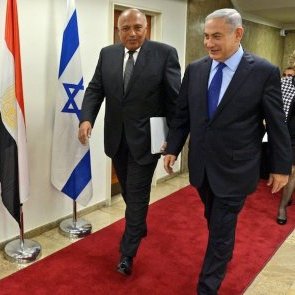
News

Turkey, Egypt, eastern Africa: Netanyahu pulls off trifecta
RON KAMPEAS
WASHINGTON
Pictured: Prime Minister Benjamin Netanyahu, right, and Egyptian Foreign Minister Sameh Shoukry meeting in Jerusalem last Sunday,
PHOTOGRAPH: GOVERNMENT PRESS OFFICE OF ISRAEL
How is it that the head of a government beating a hasty retreat from the two-state solution scored a triumphant tour of Africa, hosted a convivial summit with an Egyptian foreign minister for the first time in nearly a decade and renewed full ties with Turkey?
What Netanyahu’s diplomatic successes mean – and their limitations.
Oh, Bibi, Bibi, it’s a wild world
Donald Trump, the presumptive Republican presidential nominee, talks about retreating from America’s pre-eminent role in the world. Although he is adamant that he is pro-Israel, Trump has suggested he could charge Israel for the billions in defence assistance it receives.
Similarly, Europe, overwhelmed by a refugee crisis, is becoming more insular and, for the first time in decades, faces the prospect of falling apart as a common political force, with Britain’s planned exit from the European Union and other countries contemplating similar actions.
Meantime, calls to target Israel – or its settlements – with boycotts are increasing across the continent.
“In Israel, there’s broad recognition for no substitute for the US-Israel alliance. It remains crucial,” said Jonathan Schanzer, a vice president at the Foundation for Defence of Democracies, a think tank with a focus on the Middle East. He mentioned some challenges.
“Enhance security ties with Egypt, reinvigorate decades-old ties in Africa and mend ties with Turkey.”
The shared Sinai threat
The vastness of Egypt’s Sinai Peninsula, its strategic positioning between Asia and Africa and the porous nature of its Red Sea and Mediterranean Sea coasts, have been like catnip to terrorist groups like al-Qaida and the Islamic State.
That poses a shared challenge to Israel and Egypt and has helped already friendly ties between the nations.
Israel in recent months quietly has allowed Egyptian forces entry back into the peninsula, effectively allowing Egypt to abrogate one of the tenets, demilitarisation, of the 1979 Camp David Peace Agreement. Commensurately, Egypt has allowed Israel to target terrorists with drones.
That helps explain why Egyptian President Abdel Fatah al-Sissi was willing to send his foreign minister, Sameh Shoukry, to Israel for a high-profile visit. Keeping the Sinai secure trumped the domestic blowback Sissi knew he would endure for the visit.
Pre-empting the Palestinians, France and (maybe) the Obama administration
The French are trying to kick-start peace talks with the Palestinians under an international umbrella. The Palestinians hope to advance statehood recognition during the UN General Assembly launch in September. And President Barack Obama may deliver his own post-US election surprise, setting out the US parameters for a final-status arrangement.
All are anathema to Netanyahu, who favours direct talks with the Palestinians, where Israel is able to exercise greater leverage. Shoukry, the Egyptian foreign minister, appeared to favour the direct talks track.
Turkey is more about what Erdogan needs
Recep Tayyip Erdogan, Turkey’s president, pressed for the rupture with Israel in 2010 after Israel’s deadly raid on a Palestinian convoy aiming to breach Israel’s blockade with Gaza. Now he’s the force behind the reconciliation.
Erdogan is dealing with restive Kurds in the south, the chaos in Syria across his country’s border and the blowback from his decision recently to take tougher measures against the Islamic State. He needs to smooth waters elsewhere.
Re-establishing ties with Israel not only returns an important trade partner to eminence and restores full security ties at a time of crisis, it addresses a longstanding US demand that its two most important allies in the Middle East reconcile.
Back to Africa
The last time there was a movement on the rise to isolate Israel – in the wake of the 1973 Yom Kippur War, when the Arab League used oil leverage to pressure third parties to join their boycott – Israel countered by quietly reinforcing ties in Africa. The ties were, established as early as the 1950s and 1960s. (JTA)




